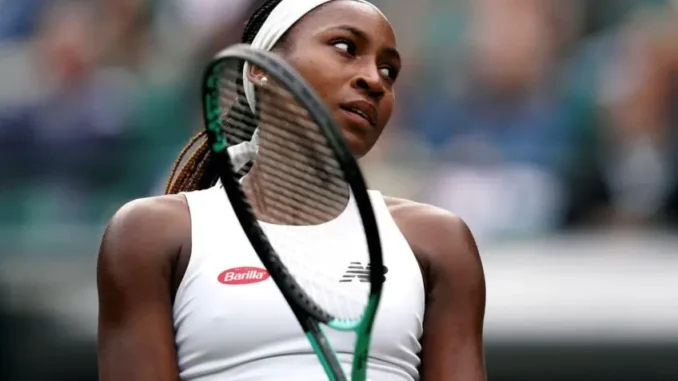
Coco Gauff, the 21-year-old American tennis prodigy and world No. 2, faced a stunning setback at the 2025 Wimbledon Championships, exiting in the first round against Ukraine’s Dayana Yastremska in a swift 7-6(3), 6-1 defeat. The loss was a bitter pill for Gauff, who entered the tournament as the No. 2 seed, riding the high of her French Open victory just a month prior. Her abrupt departure from the All England Club reignited discussions about her struggles on grass, a surface that has proven to be her kryptonite. Former world No. 1 Andy Roddick, a three-time Wimbledon finalist, offered a candid analysis of Gauff’s challenges, pinpointing a “lifelong gap” in her game that hinders her performance on the sport’s fastest surface.
Gauff’s Wimbledon journey began with promise. Her breakout moment came at the same tournament in 2019, when, as a 15-year-old qualifier, she stunned five-time champion Venus Williams en route to the fourth round. Yet, in her six appearances at Wimbledon, she has never advanced past that stage, with her 2025 loss marking her second first-round exit. “It’s strange because that’s where we got to know her,” Roddick remarked on his *Served* podcast, reflecting on the irony of her early success at Wimbledon. “Her game style is least effective on grass… Hard pace through her forehand is easier to execute on this surface.” He highlighted how the faster grass courts expose weaknesses in Gauff’s movement and forehand, which thrive on slower surfaces like clay.
Roddick, the 2003 US Open champion, had predicted Gauff’s early exit before the tournament began, citing her historical struggles on grass. “I don’t think Coco makes it to the fourth round,” he said on *Served*. “Grass is going to be her most challenging surface. It just is. The playbook hasn’t changed because she won Roland Garros.” He explained that Gauff’s strengths—her exceptional movement and topspin-heavy forehand—are optimized for clay, where she can slide and generate spin to control points. On grass, however, the speed and lower bounce amplify vulnerabilities, particularly when opponents target her forehand with pace. “She’s great at what she does, but the most challenging surface is going to be grass, especially against a big hitter like Yastremska,” Roddick noted, praising Yastremska’s strong grass-court form leading into the match.
Gauff herself acknowledged the need for adjustments after her loss. “I think it’s just changing my playing style a little bit, which is difficult,” she said in her post-match press conference. “I know on grass I do. I feel like by the time I find it, it’s already time to play. It’s difficult, but I have faith that if I can make these adjustments, I can do well here.” Her preparation was limited, with only two days of practice before Wimbledon, a decision she now plans to rethink. “I don’t like to play the week before a major, but I have vowed to reconsider my approach when the grass season approaches next year,” she added, determined not to “write myself off grass this early in my career.”
Despite the disappointment, Roddick urged perspective. “There’s no criticism for Coco Gauff right now. She just won her second slam. One of the best players in the world,” he said. He suggested that if Gauff had been offered a French Open title at the cost of early exits elsewhere, “she signs that contract.” Her 2025 season, highlighted by a 6-7(5), 6-2, 6-4 victory over Aryna Sabalenka in the French Open final, marks her as the youngest player since Serena Williams in 2002 to win Grand Slams on different surfaces. Yet, her 11-5 Wimbledon record and 66% win percentage on grass—compared to 75% on clay—underscore the challenge.
Yastremska, ranked No. 42, capitalized on Gauff’s struggles, delivering six winners to Gauff’s 29 unforced errors. “Props to you, Yastremska. She was playing great coming in,” Roddick said, noting her recent success in Nottingham and Eastbourne. Gauff’s emotional post-match demeanor reflected the sting of defeat, but Roddick emphasized her youth and potential. “She’s 21. She has time on her side,” he said, confident that her talent will eventually overcome her grass-court woes.
As Gauff prepares for the hard-court season, including the US Open where she won in 2023, her Wimbledon loss serves as a reminder of the unique demands of grass. With a tough draw that could have included Victoria Azarenka or Sofia Kenin, the road was never easy. Yet, Gauff’s resolve remains unshaken. “I really do want to do well here,” she said, signaling her intent to conquer Wimbledon’s green courts in the years ahead.
Leave a Reply